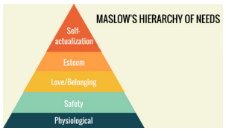The Humanistic approach -A-Level Psychology
The Humanistic approach:
-an approach to understanding behaviour that emphasises the importance of subjective experience and each person’s capacity for self determination.
Free will:
The notion that humans can make choices and are not determined by biological or external factors and act as active agents.Humanistic psychologists reject scientific models that establish general principles of human behaviour as everyone is unique.
Self-actualisation:
The desire to grow psychologically and fulfil one’s full potential.All four lower levels have to be met for self-actualisation to occur.Personal growth is concerned with developing and changing as a person to become fulfilled ,satisfied,and goal orientated.

The self,congruence and conditions of worth:
Rogers argued that for personal growth to occur an individual’s self(the way they see themselves)has to be in congruence with their ideal self.If the gap is too big ,the person will experience incongruence and negative feelings meaning that self-actualisation can’t be reached.
Conditions of worth-when a parent places limits or boundaries on their love of their children.
Evaluation:
Cultural bias-the humanistic approach would be applicable to individualist cultures more than to collectivist cultures which may not easily identify with the ideas of humanistic psychology.
Not reductionist-Humanists reject any attempt to break up behaviour and experience into smaller components,instead they advocate holism(the idea that subjective experience can only be understood by considering the whole person).This approach has more validity than its alternatives by considering meaningful human behaviour within its real-life context.
The Humanistic approach is a psychological perspective that emphasizes the unique experiences and potential for growth of the individual. It suggests that people have free will and are capable of making choices that can lead to personal growth and self-actualization.
The key figures associated with the Humanistic approach in A-Level Psychology are Abraham Maslow and Carl Rogers.
The Humanistic approach differs from other psychological perspectives in A-Level Psychology, such as the psychodynamic and behavioral approaches, by emphasizing the subjective experiences of the individual and their potential for self-growth and self-actualization, rather than focusing on unconscious processes or external stimuli.
Some practical applications of the Humanistic approach in A-Level Psychology include person-centered therapy, which emphasizes the importance of the therapist-client relationship and the client’s self-exploration, and positive psychology, which focuses on promoting well-being and resilience through interventions such as gratitude journaling and mindfulness meditation.
Studying the Humanistic approach in A-Level Psychology can benefit you by providing you with a deeper understanding of human behavior and the human experience, and by equipping you with practical skills for promoting personal growth and well-being. Additionally, knowledge of the Humanistic approach may be useful for those considering careers in counseling or mental health.
You can apply the Humanistic approach in your own life by focusing on your personal growth and self-actualization, and by making choices that align with your values and goals. This might involve practicing self-reflection, setting realistic goals for yourself, and seeking out opportunities for personal development and self-expression.






Still got a question? Leave a comment
Leave a comment